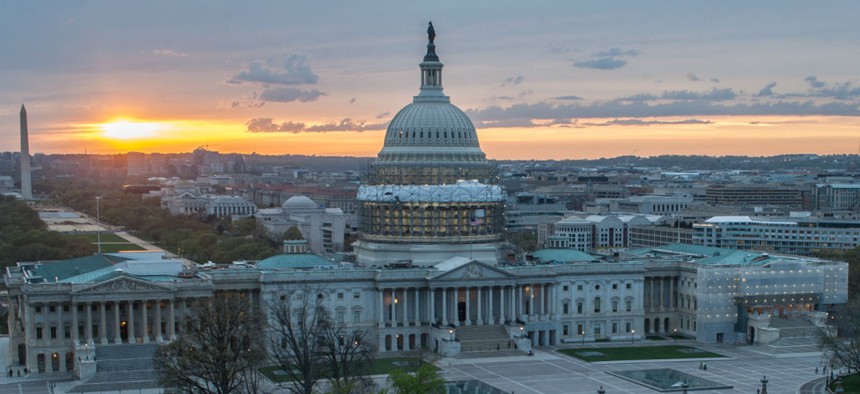
Congress could curb politicization by fully funding the watchdogs and communicating "more regularly with IGs to understand where stonewalling, obstruction and other barriers to inquiries exist," scholars find. Architect of the Capitol
The Most Politicized Inspectors General? Education, State and HUD
Brookings scholars call on Congress to consult and better fund agency watchdogs.
The government’s 72 inspectors general, though an underappreciated force in combatting waste, fraud and abuse, too often diminish their effectiveness by becoming politicized, a team of scholars said in a new study.
“Political influence can manifest in the stalling of OIG investigations; making certain staff unavailable; providing slow or incomplete responses to requests; or creating a general culture that is uncooperative,” wrote John Hudak and Grace Wallack of the Brookings Institution’s Center for Effective Public Management in a paper released Monday titled “ Political Appointees as Barriers to Government Efficiency and Effectiveness.”
“If Congress is serious about protecting the integrity of IGs, saving taxpayer money, and preventing waste, fraud, and abuse in the executive branch,” the paper stated, “they must do their best to guard against political influence.”
One colorful example cited is the way former acting Homeland Security Department IG Charles Edwards handled the 2012 prostitution scandal that rocked the Secret Service. Edwards “had improperly tampered with IG reports, all the while seeking nomination as the permanent DHS IG,” the scholars noted. “Whistleblowers revealed that Edwards ordered them to remove potentially damaging information about the Service and evidence that implicated White House staff; others alleged he edited or delayed reports.”
To gauge politicization, the scholars used another political scientist’s metric combined with a ratio of agency political appointees to career-level managers in leadership positions. Their results ranked the most politicized inspectors general as those at the departments of Education, State, and Housing and Urban Development; the least politicized were at the Treasury Inspector General for Tax Administration, the Social Security Administration and the Veterans Affairs Department.
“The strongest negative effect comes from the presence of Senate-confirmed appointees—appointees who tend to be the closest with the president and are among the most political,” the scholars said. “Agencies with higher numbers of these officials see the most drastic decreases in OIG effectiveness.”
Trying to identify or categorize what makes an IG effective “is quite controversial,” Hudak and Wallack write. “IGs have active and passive impacts on agency operations. They can rein in bad behavior through active audits, investigations, arrests, and recommendations. They also have an indirect effect, as their activity—even their very existence—likely deters bad behaviors inside and outside of agencies.”
The paper also ranks the IGs by their average return on investment to their home agencies: The most profitable for Uncle Sam are IGs at SSA, VA and HUD. The watchdogs providing the least return on investment are at Homeland Security, State and the Treasury Department.
Having more auditors is clearly an advantage to IGs, who have long considered themselves underfunded.
The largest full-time staffs compared with staff at the home agencies are those at the IG offices of SSA, HUD and Education. The smallest IG staffs are at the Office of Personnel Management, Treasury and the Commerce Department, the study said. “The negative impact of Senate-confirmed appointees on IG effectiveness is more than four times greater in understaffed OIGs than in well-staffed ones,” the scholars said.
One way for Congress to curb politicization, the two concluded, is to fully fund the watchdogs and “to communicate more regularly with IGs to understand where stonewalling, obstruction and other barriers to inquiries exist. In those situations, Congress has a duty through its own oversight powers to hold hearings or communicate displeasure to agencies that are actively undermining investigations.”
The sometimes awkward position of IGs in serving two masters—the president and Congress—“can be challenging,” they write, ”but it can also allow for avenues to resolve politically-motivated logjams.”







